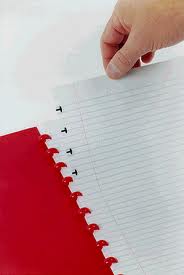As a PhD student I generate a lot of pages with calculations, ideas and lecture notes.
Most of them are useful only for a short amount of time, but some may be important for much longer (when writing a paper, or when having new ideas to continue a once abandoned project). Typically I work on a few project simultaneously.
The question is, what is good practice for taking and keeping notes? (With or without computer apps.)
Writing on single sheets (even if adding date and title) makes it easy to organize by topic, but also easy to lose. Keeping them in one notepad makes it harder to collect useful things of one topic in one place.

